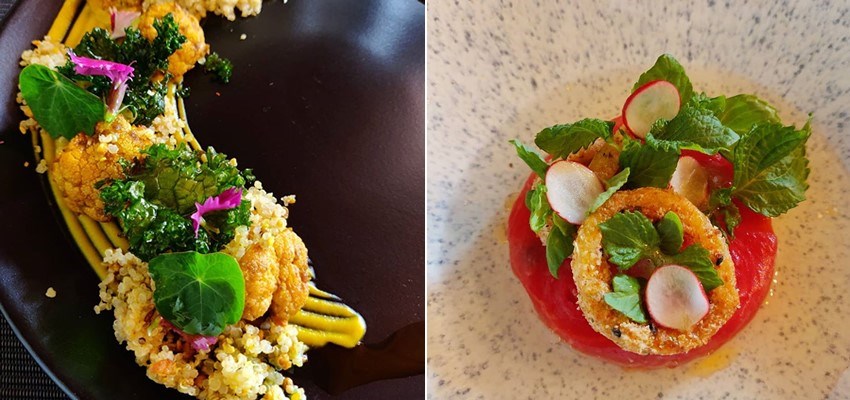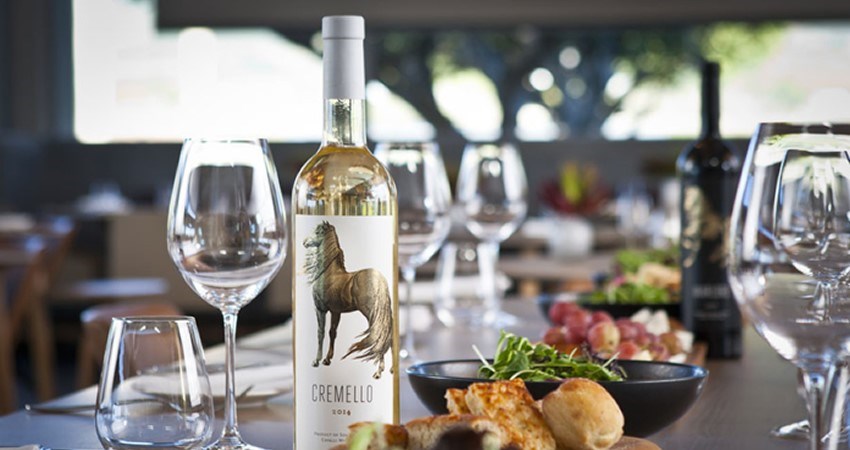At a ground-breaking food and wine tasting at Neethlingshof in early November, chef Brendan Stein created a four-course vegan menu to highlight the “vegan-friendly” credo now printed in capital red letters on the estate’s wine label. Chef said the challenge was “How do I create a menu with a range of flavours using only vegan ingredients?” Renowned wine industry consultant Carina Gouws commented that the wines are meeting a growing demand for vegan wines on key export markets.
On a tractor tour of the vineyards, cellar master De Wet Viljoen underscored the commitment at Neethlingshof to conservation, bio-diversity and sustainability. Standing at the highest point of the farm, he pointed out the granite outcrops and renosterveld, the habitat of silver-backed jackal, foxes, caracal, leopard, eagles and owls. The focus at this heritage estate (1692) is on the single vineyard wines in their short story collection – Jackal’s Dance Sauvignon Blanc (from jakkalsdans vineyard), Owl Post Pinotage (after the owl box nests for these nocturnal predators which control pests without pesticides), The Caracal (a Bordeaux-style blend), Ode to Nature Riesling and The Six Flowers (a six-way white blend after the flowers on the gable, representing the founder’s children).

Wine has been made at Neethlingshof since 1802 – a farm where 64% of 277 hectares are put aside for nature conservation. Every wine tells a story of the struggle to preserve the fragile balance between viticulture, the natural flora and fauna of the region. A slow tractor ride through the vineyards is the best way to experience the diversity of the terroir– and appreciate a tasting of the six single vineyard wines (five won 4,5 stars in Platter’s new 2020 SA Wines). Chef’s new-world vegan menu with an umami Asian twist showcased the wines with wonderful taste and texture combos – from tofu and black bean chilli fritters to yuzu compressed watermelon in tomato consommé with lemongrass gel and chermoula cauliflower with quinoa and dukkha. The wine tasting notes declare, “Strict vegan guidelines were adhered to during the entire farming and winemaking process”.
What’s more, the new menu at Neethlingshof highlights exotic dishes which are “deliciously vegan”. A vegan pairing was the highlight of another tasting at Cavalli in Stellenbosch in mid-2019. New chef Michael Deg (ex Delaire Graff) created a fabulous vegan menu to match the layered barrel-fermented flavours of Cavalli’s flagship Cremello blend of Chenin Blanc, Chardonnay and Verdelho made by talented winemakers Craig Barnard and Kerrylea Alborough. In one of the smartest tastings of the year, they deconstructed the individual components into a single varietal tasting before leading a vertical flight of the blend itself. The tomato ragu tortellini Vichyssoise – and cauliflower and chive risotto paired perfectly with the creamy, savoury and exotic character of the blend.

Another of the tastiest vegetarian dishes over a food and wine pairing in 2019 was at Delaire Graff. Chef Kevin Grobler, the former head chef at Michelin-starred Jan restaurant in Nice, paired Delaire Graff’s award-winning Banghoek Reserve Chardonnay 2018 with a sublime composition of the humble pea - pea mousse, marinated fresh peas, fermented garlic emulsion and bocconcini.
Capturing the zeitgeist of the new sustainable mantra in food and wine, chef Grobler comments, “Our menu is built around the freshest seasonal and organic produce, sourced from Delaire Graff’s extensive edible gardens. The kitchen works with a network of small-scale local farmers, each hand-picked for their sustainable, ethical practices. The fish on the menu is all line caught and SASSI green listed. Our food is very local, earthy and real. It’s about purity of flavour and local provenance.”
In August 2019, Spier, a Cape winery at the forefront of sustainability initiatives,announced it was the first winery in the world to win Vegan Standard accreditation from the global Control Union. Four of the farm’s iconic ranges – Creative Block, 21 Gables, Frans K Smit, Seaward – bear the new vegan-friendly seal from the 2018 vintage for reds – and the 2019 vintage for whites. Commenting on the growing trend to veganism, veteran cellar master Frans Smit (1995) says, “Vegan certification not only demonstrates our commitment to a greener, animal-friendly future; it also means that vegan drinkers can now enjoy our wines. The certification is an important first step and represents a significant percentage of the wines we offer. This does not affect the taste of the wines in any way, and we intend to have the rest of our wines Vegan Standard-accredited in the coming years.”
What is the key difference between vegan and non-vegan wines? Wines made using animal-derived fining agents - the most commonly used are casein (a milk protein), albumin (egg whites), gelatin (animal protein) and isinglass (fish bladder protein) – are not considered vegan. During winemaking, fining agents are used to remove harmless organic particles that make the wine cloudy (including protein and yeast molecules, making it easy to clarify the wine, but leaving behind miniscule residual traces. (Whether there are traces or not, vegans object to the very use of animal by-products in wine.) Fortunately, there are non-animal alternatives – activated charcoal, bentonite or clay-based fining agents – as well as vegan-friendly additives and cleaning materials which Spier uses instead.
I enjoyed tasting the new Seaward range – one of the newly accredited vegan-friendly wines made by Spier. Sourced from dryland maritime vineyards, the Seaward Chardonnay 2018 shows the elegance, finesse and intense quality of cool-climate wines, underpinned by minerality. During 2019, I’ve also tasted vegan-friendly wines made by organic producers Laibach, Reyneke, Stellar and Org de Rac. Check out one hundred vegan-friendly wine and MCC producers listed by www.vegansa.com (only white wines are vegan in some cases). Major vegan wine brands includeBuitenverwachting, Creation, Douglas Green, Durbanville Hills, Fairview, Glen Carlou, Graham Beck, HPF, Jordan, Haute Cabriere,Kaapzicht, Leopard’s Leap, Longridge, Painted Wolf, Saxenburg, Sijnn, Spice Route, Villiera and Waterkloof.ManySwartland wine brands are vegan too, from Sadie and Mullineux to Nativo.
In a fascinating interview on wine.co.za in October 2019 (link), Frank Meaker, the veteran winemaker at 0rg de Rac, a key organic producer in the Swartland, commented, “The growth of veganism among the young crowd is a reality. 25 per cent of all Americans between 25 and 34 are either vegan or vegetarian. Forbes and The Economist declared 2019 the Year of Veganism. My own kids turned vegan along with many of their peers. It is a reality tied with the concern for the environment and respect for one’s own health. And it is growing.
“Org de Rac did not set out to specifically make vegan wine. But due to our organic approach in the vineyard we cut out as many additives in the winemaking process which happened to include animal-based fining agents. Today most of the winemaking fraternity is aware of this segment of the customer-base and know that it is growing. I don’t think all wines will ever be vegan, but the number of producers choosing that option or making customers aware of their vegan status is growing.”
I also enjoyed tasting the vegan-friendly wines of Lourensford in 2019. Cellarmaster Hannes Nel prides himself on creating wines that celebrate winemaking principles of minimal intervention. He says, “We use mineral and plant derived products during the winemaking process. These ingredients sourced from accredited manufacturers are great alternatives. We are able to achieve a more eco-conscious end-result in the bottle without sacrificing any quality or flavour. Lourensford’s vegan-friendly wines are testimony to an estate with environmental sustainability at the core of what we do.” All Lourensford wines are vegan-friendly. “It is not difficult to make a vegan-friendly wine, it just comes down to the choice of fining agent during the winemaking process,” says Nel.
This season you can even buy vegan-friendly (and no added sulphur) wines in a snazzy 250ml can. Sourced from grapes grown in the Swartland and Stellenbosch, Uncanny Wines was co-founded by business partners Arnold Vlok and Ruan Viljoen. Uncanny Wine is South Africa’s first certified (Wine & Spirits Board) and premium canned wine –available in Merlot and Chenin Blanc (R40). Vlok comments “The lightweight of the cans significantly increases the volume to weight ratio when transporting, which goes a long way toward reducing the carbon footprint of the product”– the cans chill quicker, are unbreakable, recyclable and have no tinny, metallic taste whatsoever. In the USA, canned wines are an US$80 million (R1,2 billion) industry - where sales grew by 69% in 2019.
In a column entitled “Vegan wines becoming more popular”, Marion Ivaldi writes in Vitisphere (4 October 2017),“Vegan wines are THE big fashion at the moment. Not a week goes by in France without a winery launching a vegan label They create a point of difference from organic wines and although they target a niche consumer audience, they align with a concern shared by many consumers, which is to end cruelty to animals. Plant-based fining agents were developed in response to issues that had no ideological motives: they were simply designed to avoid confusing consumers, many of whom were troubled to discover that a drink made entirely from grapes could contain animal-based allergens. Plant-based fining have now become a statement, epitomising a cause.”
You don’t have to be vegan to want to know what goes into the wines you drink – many consumers do NOT want animal additives. Vegan debate online reveals frustration about the paucity of information on vegan wines in South Africa. Would it be feasible to introduce a new V symbol to audit and identify vegan wines in Platter’s annual Wine Guide? (Symbols in use already show wines which are organic and biodynamic – but these are not necessarily vegan). A brief definition of vegan wines in the winemaking terms glossary would be useful too – and acknowledge the impact of this growing niche market in wine. Lastly, a vegan symbol on all vegan-friendly wine labels like the one used to depict vegan-friendly wines in Europe would assist consumers in making the right choice.
The Compassionate Cookbook by Toni Brockhoven with dozens of easy-to-use plant-based recipes was published by Beauty without Cruelty in late 2019 – contact www.bwcsa.co.za for orders.